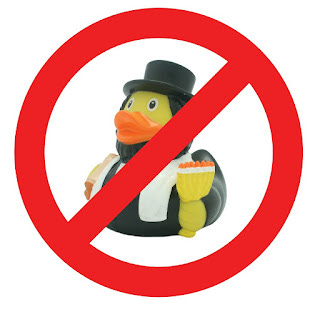When Rabbis Don't Quack

In the all-time most-read post on this blog, When Rabbis Quack, I criticized an as-yet unpublished work on alternative medicine which featured an array of rabbinic endorsements. Then, after the book was published, I critiqued a too-positive (albeit still critical) feature article about the book which appeared in Mishpacha magazine. I was pleased to see that Mishpacha issued an apology and retraction of this article:
CLARIFICATION: Several weeks ago, we addressed in these pages the complicated and high-stakes issue of alternative medicine and associated nontraditional practices. In retrospect, we have come to realize that such a sensitive and controversial topic should not have appeared in these pages.
Alternative medicine is an extremely complex and delicate topic, from both a halachic standpoint as well as a scientific point of view. Any attempt to address the topic demands a fair and balanced presentation that is far beyond the form of a feature article in a weekly magazine.
Many of these methods may also involve serious issurei d'Oraisa. Rav Yisroel Belsky ztz"l was known to have been vehemently opposed to such practices on these grounds. Although these potential issurim were noted in the article, unfortunately, they were not sufficiently highlighted, and some critical sources of information were overlooked, especially Rav Belsky's new sefer on the topic. Additionally, gedolei harabbanim have pointed to many unfortunate instances in which people placed themselves in grave danger by eschewing traditional medicine and opting for speculative methods.
The article also alluded to the possibility of an individual having gained mystical healing powers via various encounters. Considering this method as an avenue of medical healing is misguided. While the merits of alternative medicine can be debated, and the discipline has some precedent, this form of curing has no precedent, and can be a dangerous road to travel. Investing hope in people who claim to have special mystical powers is a foolish waste of time, energy, and money, and possibly dangerous as well.
Mishpacha feels an achrayus to the tzibbur and has long prided itself on seeking guidance from gedolei harabbanim. We thank the rabbanim who have contacted us in response to the article and with pride are modeh al he'emes. We regret publishing a piece that may have conveyed approval of these problematic practices, and strongly recommend that everyone proceed with great caution in this area and consult their rav and doctor when considering pursuing alternative medicine. (18 Kislev 5778 / 1 December 6, 2017)
It's good to know that many Rabbanim protested any praise for this book. And it's nice to see this retraction, although I would not agree that "such a sensitive and controversial topic should not have appeared in these pages... Any attempt to address the topic demands a fair and balanced presentation that is far beyond the form of a feature article in a weekly magazine." I think that a weekly popular magazine such as Mishpacha is an important forum in which to discuss such a topic; it's just that I don't think that the topic needs an Israel/Palestinian style "fair and balanced presentation." It needs an honest critique.


